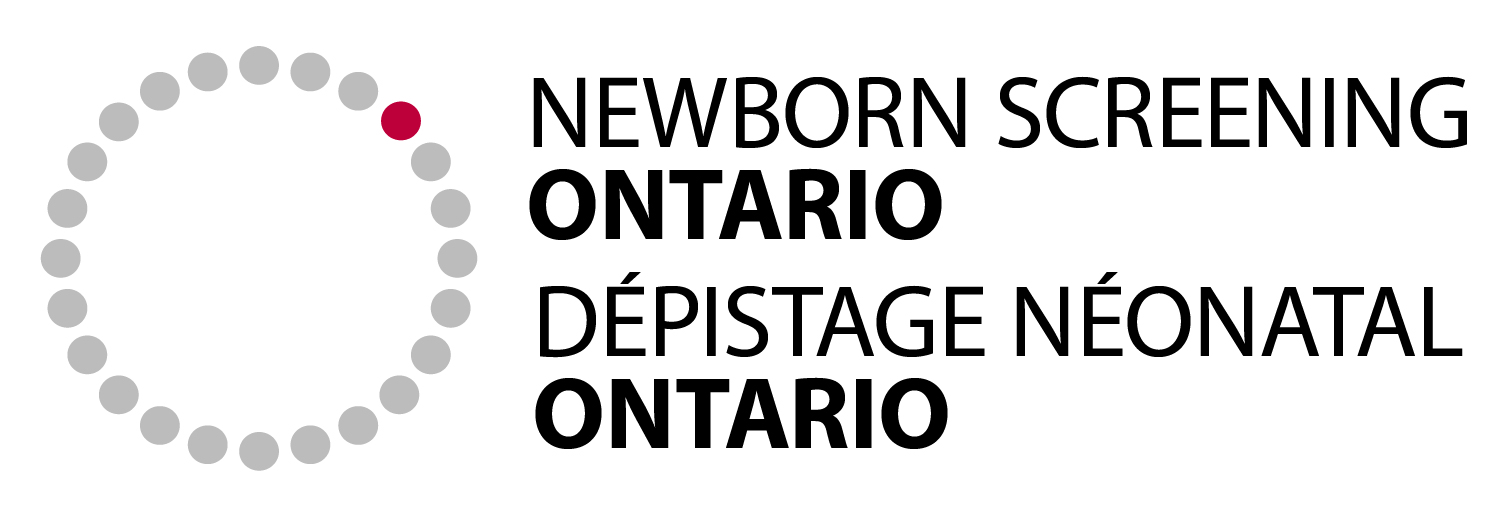- Hearing screening helps find babies who have permanent hearing loss (PHL) or have a higher chance of developing it in early childhood.
- Finding hearing loss as early as possible allows children with PHL to get the support and services they need to learn language and optimize development.
At a glance
| Approximate incidence in Ontario: | Marker measured: | Screening improves: | Interventions: |
| 1/200 | Cytomegalovirus detected on the dried blood spot |
Hearing, speech, language, and developmental outcomes |
Treatment with medication, developmental surveillance, audiologic monitoring, amplification, cochlear implantation, and language development services |
What is risk factor screening for Permanent Hearing Loss (PHL)?
- Screening for PHL risk factors is part of infant hearing screening.
- Risk factor screening for PHL looks for the most common environmental (congenital Cytomegalovirus) and genetic (variants in GJB2 and SLC26A4 genes) causes of childhood PHL using the dried blood spot collected for routine newborn screening.
- CMV is a common virus. About 1 in 3 (33%) children have had CMV by 5 years of age and by adulthood most people have had the infection.
- Most healthy children and adults who get CMV do not even know it because they don’t have any signs or symptoms.
- When a pregnant woman is infected with CMV there is a chance it could be passed to the baby. When this happens and a baby is born with CMV it is called congenital CMV infection, or cCMV for short. About 1 in 200 babies are born with cCMV.
- You will be contacted if your baby has a positive CMV newborn screening result. A positive CMV screening result means that your baby has a high chance of having a cCMV Your baby should have an assessment by a pediatrician or Infectious Diseases (ID) doctor, who will discuss the screening results in more detail and arrange further testing.
- Your baby will be referred to a pediatrician or Infectious Diseases doctor for an assessment that includes confirmatory urine CMV testing, blood tests, a physical exam and head imaging to find out if your baby has any signs or symptoms of congenital CMV.
- A detailed hearing test will also be arranged by the Infant Hearing Program.
- The results of these tests will help figure out if your baby has congenital CMV, whether they may benefit from treatment, and what other follow-up may be suggested.
Possible follow-up test results
Most babies who have a positive CMV screening result will be confirmed to have a congenital CMV (cCMV) infection. Sometimes, a baby may be found to not have a cCMV infection, or it may be unclear whether a baby has a cCMV infection after the assessment.
- The baby has a cCMV infection and does not have any signs or symptoms (i.e. is asymptomatic)
- About 80% to 85% of children with cCMV remain healthy and never have any problems related to the infection
- The baby has a cCMV infection, and has signs or symptoms (i.e. is symptomatic)
- About 10-15% of babies with cCMV have signs or symptoms of the infection. Symptoms can include: a rash, jaundice, hearing loss, small size during pregnancy and at birth, small head size, enlarged liver and/or spleen, or vision problems.
- Babies who are possibly symptomatic of cCMV will be referred to an ID doctor for further
- If the ID doctor confirms that your baby is symptomatic, treatment with medication may be an option for some The best time to start treatment in a baby who has symptoms of cCMV is within the first month of life.
- The baby does NOT have a cCMV infection (i.e. false positive result)
- If after the assessment the pediatrician or ID doctor confirms that your baby does not have cCMV, no further follow-up is needed for your baby regarding Your baby should continue to get the regular care that children receive for their age.
- It is unclear whether the baby has a cCMV infection
- Rarely, the results from the initial assessment for cCMV are not able to tell us whether your baby has or does not have a cCMV infection. The pediatrician or ID doctor will discuss whether other tests, or more follow-up is suggested for your baby.
Living with congenital CMV (cCMV)
- About 80% of children with cCMV remain healthy and do not develop any long-term health problems. However, about 50% of those with symptoms at birth and 10% of those without symptoms at birth, develop hearing loss or have delays in their development.
- We recommend ongoing appointments with a health care provider to have your baby’s growth and development checked.
- As your child grows you will also be contacted by the Infant Hearing Program to have their hearing monitored.
Si votre bébé a été dépisté positif pour l’hypothyroïdie congénitale, cliquez ici pour plus d'informations.
Contact Us
Children’s Hospital of Eastern Ontario
415 Smyth Road
Ottawa, Ontario K1H 8M8
Toll-Free: 1-877-627-8330
Local: (613) 738-3222
Fax: (613) 738-0853
